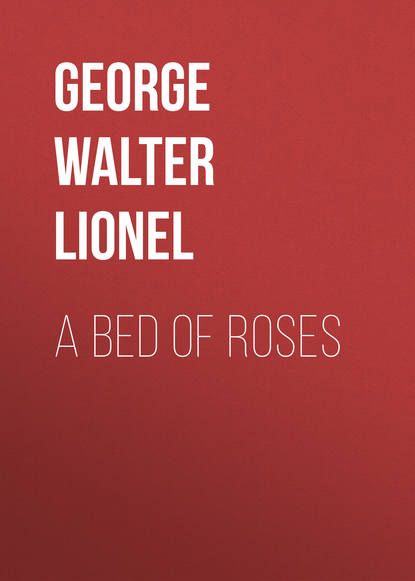По всем вопросам обращайтесь на: info@litportal.ru
(©) 2003-2024.
✖
A Bed of Roses
Настройки чтения
Размер шрифта
Высота строк
Поля
'Them lidies' maids allus ketches on,' said the large woman savagely. 'Tell yer wot, though, p'raps they wouldn't if they was to see Bell's kitching. Oh, Lor'! There ain't no black-beetles. I don't think.'
The little faded woman looked longingly at Victoria standing on the steps. A loafer sprung from thin air as is the way of his kind and leant against the area railings, touching his cap whenever he caught Victoria's eye, indicating at times the box on the roof of the cab. From the silent house came a noise that grew louder and louder as the footsteps drew nearer the door. Victoria recognised the familiar shuffle. Mrs Bell opened the door.
'Lor, mum,' she cried, 'I'm glad to see you again.' She caught sight of the trunk. 'Oh, are you moving, mum?'
'Yes, Mrs Bell,' said Victoria. 'I'm moving and I want some rooms. Of course I thought of you.'
Mrs Bell's face fell. 'Oh, I'm so sorry, mum. The house is full. If you'd come last week I had the first floor back.' She seemed genuinely distressed. She liked her quiet lodger and to turn away business of any kind was always depressing.
Victoria felt dashed. She remembered Edward's consternation on discovering the change in Gower Street and, for the first time, sympathised.
'Oh, I'm so sorry too, Mrs Bell. I should like to have come back to you.'
'Couldn't you wait until next month, mum!' said Mrs Bell, reluctant to turn her away. 'The gentleman in the second floor front, he's going away to Rhodesia. It's your old room, mum.'
'I'm afraid not,' said Victoria with a smile. 'In fact I must find lodgings at once. Never mind, if I don't like them I'll come back here. But can't you recommend somebody?'
Mrs Bell looked right and left, then into the archway. The little faded woman had disappeared. The landlady in the billowy blouse was still surveying the scene. Mrs Bell froze her with a single look.
'No, mum, can't say I know of anybody, leastways not here,' she said slowly. 'It's a nice neighbourhood of course, but the houses here, they look all right, but oh, mum, you should see their kitchens! Dirty ain't the word, mum. But wait a bit, mum, if you wouldn't mind that, I've got a sister who's got a very nice room. She lives in Castle Street, mum, near Oxford Circus. It's a nice neighbourhood, of course not so near the Park,' added Mrs Bell with conscious superiority.
'I don't mind, Mrs Bell,' said Victoria. 'I'm not fashionable.'
'Oh, mum,' cried Mrs Bell, endeavouring to imply together the superiority of Portsea Place and the respectability of any street patronised by her family, 'I'm sure you'll like it. I'll give you the address.'
In a few minutes Victoria was speeding eastwards. Now she was rooted up for good. She was leaving behind her Curran's and Mrs Bell, slender links between her and home life, links still, however. The pageant of London rolled by her, heaving, bursting with rich life. The sunshine around her bade her be of good cheer. Then the cab turned a corner and, with the suddenness of a stage effect, it carried its burden into the haunts of darkness and malodour.
CHAPTER XI
'Telegraph, mum,' said a voice.
Victoria started up from the big armchair with a suddenness that almost shot her out of it. It was the brother of the one in Portsea Place and shared its constitutional objection to being sat upon. It was part of the 'sweet' which Miss Briggs had divided with Mrs Bell when their grandmother died.
'Thanks, Miss Briggs,' said Victoria. 'By the way, I don't think that egg is quite fresh. And why does Hetty put the armchair in front of the cupboard every day so that I can't open it?'
'The slut, I don't see there's anything the matter with it,' remarked Miss Briggs, simultaneously endorsing the complaint against Hetty and defending her own marketing.
'Oh, yes there is, Miss Briggs,' snapped Victoria with a sharpness which would have been foreign to her some months before. 'Don't let it happen again or I'll do my own catering.'
Miss Briggs collapsed on the spot. The profits on the three and sixpence a week for 'tea, bread and butter and anything that's going,' formed quite a substantial portion of her budget.
'Oh, I'm sorry, mum,' she said, 'it's Hetty bought 'em this week. The slut, I'll talk to her.'
Victoria took no notice of the penitent landlady and opened the Telegraph. She absorbed the fact that Consols had gone up an eighth and that contangoes were in process of arrangement, without interest or understanding. She was thinking of something else. Miss Briggs coughed apologetically. Victoria looked up. Miss Briggs reflectively tied knots in her apron string. She was a tall, lantern-jawed woman of no particular age; old looking for thirty-five perhaps or young looking for fifty. Her brown hair, plentifully sprinkled with grey, broke out in wisps over each ear and at the back of the neck. Her perfectly flat chest allowed big bags of coarse black serge to hang over her dirty white apron. Her hands played mechanically with the strings, while her water-coloured eye fixed upon the Telegraph.
'You shouldn't read that paper, mum,' she remarked.
'Why not?' asked Victoria, with a smile, 'isn't it a good one?'
'Oh, yes, mum, I don't say that,' said Miss Briggs with the respect that she felt for the buyers of penny papers. 'There's none better. Mine's the Daily Mail of course and just a peep into Reynolds before the young gent on the first floor front. But you shouldn't have it. Tizer's your paper.'
'Tizer?' said Victoria interrogatively.
'Morning Advertiser, mum; that's the one for advertisements.'
'But how do you know I read the advertisements, Miss Briggs?' asked Victoria still smiling.
'Oh, mum, excuse the liberty,' said Miss Briggs in great trepidation. 'It's the only sheet I don't find when I comes up to do the bed. Tizer's the one for you, mum; I had a young lady 'ere, once. Got a job at the Inverness Lounge, she did. Married a clergyman, they say. He's divorced her now.'
'That's an encouraging story, Miss Briggs,' said Victoria with a twinkle in her eye. 'How do you know I want to be a barmaid, though?'
'Oh, one has to be what one can, mum,' said Miss Briggs sorrowfully. 'Sure enough, it ain't all honey and it ain't all jam keeping this house. The bells, they rings all day and it's the breakfast that's bad and their ain't blankets enough, and I never 'ad a scuttle big enough to please 'em for sixpence. But you ain't doing that, mum,' she added after a pause devoted to the consideration of her wrongs. 'A young lady like you, she ought to be behind the bar.'
Victoria laughed aloud. 'Thanks for the hint, Miss Briggs,' she said, 'I'll think it over. To-day however, I'm going to try my luck on the stage. What do you think of that?'
'Going on tour?' cried Miss Briggs in a tone of tense anxiety.
'Well, not yet,' said Victoria soothingly. 'I'm going to see an agent.'
'Oh, that's all right,' said Miss Briggs with ghoulish relief. 'Hope yer'll get a job,' she added as confidently as a man offering a drink to a teetotaller. At that moment a fearful clattering on the stairs announced that Hetty and the pail had suddenly descended to the lower landing. Liquid noises followed. Miss Briggs rushed out. Victoria jumped up and slammed her door on the chaotic scene. She returned to the Telegraph. The last six weeks in the Castle Street lodging house had taught her that these were happenings quite devoid of importance.
Victoria spread out the Telegraph, ignored the foreign news, the leaders and the shocking revelations as to the Government's Saharan policy; she dallied for a moment over 'gowns for débutantes,' for she was a true woman, and passed on to the advertisements. She was getting quite experienced as a reader and could sift the wheat from the chaff with some accuracy. She knew that she could safely ignore applications for lady helps in 'small families,' at least unless she was willing to clean boots and blacklead grates for five shillings a week and meals when an opportunity occurred; her last revelation as to the nature of a post of housekeeper to an elderly gentleman who had retired from business into the quietude of Surbiton had not been edifying. The 'Financial and Businesses' column left her colder than she had been when she left Mrs Holt with nearly thirty-seven pounds. Then she was a capitalist and pondered longingly over the proposals of tobacconists, fancy goods firms, and stationers, who were prepared to guarantee a fortune to any person who could muster thirty pounds. Fortunately Miss Briggs had undeceived her. In her variegated experience, she herself had surrendered some sixty golden sovereigns to the persuasive owner of a flourishing newsagent's business. After a few weeks of vain attempts to induce the neighbourhood to indulge in the news of the day, she had been glad to sell her stock of sweets for eighteen shillings, and to take half a crown for a hundred penny novelettes.
Victoria turned to the 'Situations Vacant.' Their numbers were deceptive. She had never realised before how many people live by fitting other people for work they cannot get. Two thirds of the advertisements offered wonderful opportunities for sons of gentlemen in the offices of architects and engineers on payment of a premium; she also found she could become a lady gardener if she would only follow the courses in some dukery and meanwhile live on air; others would teach her shorthand, typewriting or the art of the secretary. All these she now calmly skipped. She was obviously unfitted to be the matron of an asylum for the feeble-minded. Such experience had not been hers, nor had she the redoubtable record which would open the gates of an emporium. An illegible hand would exclude her from the City.
'No,' thought Victoria, 'I'm an unskilled labourer; that's what I am.' She wearily skimmed the agencies; as a matter of habit noted the demand for two companions and one nursery governess and put the paper aside. There was not much hope in any of these, for one was for Tiverton, the other for Cardiff, which would make a personal interview a costly business; the third, discreetly cloaked by an initial, suggested by its terseness a companionship probably undue in its intimacy. The last six weeks had opened Victoria's eyes to the unpleasant aspects of life, so much so that she wondered whether there were any other. She felt now that London was waiting for her outside, waiting for her to have spent her last copper, when she would come out to be eaten so that she might eat.
Whatever her conceit might have been six months before, Victoria had lost it all. She could do nothing that was wanted and desired everything she could not get. She had tried all sources and found them dry. Commercialism, philanthropy, and five per cent. philanthropy had failed her. What can you do? was their cry. And, the answer being 'nothing,' their retort had been 'No more can we.'
Victoria turned over in her mind her interview with the Honorary Secretary of the British Women's Imperial Self Help Association. 'Of course,' said the Secretary, 'we will be glad to register you. We need some references and, as our principle is to foster the independence and self-respect of those whom we endeavour to place in positions such as may befit their social status, we are compelled to demand a fee of five shillings.'
'Oh, self help, I see,' said Victoria sardonically, for she was beginning to understand the world.
'Yes,' replied the Honorary Secretary, oblivious of the sneer, for his mind was cast in the parliamentary mould, 'by adhering to our principle and by this means only can we hope to stem the tide of pauperism to which modern socialistic tendencies are – are – spurring the masses.' Victoria had paid five shillings for this immortal metaphor and within a week had received an invitation to attend a meeting presided over by several countesses.
The B. W. I. S. H. A., (as it was called by its intimates) had induced in Victoria suspicions of societies in general. She had, however, applied also to the Ladies' Provider. Its name left one in doubt whether it provided ladies with persons or whether it provided ladies to persons who might not be ladies. The Secretary in this case, was not Honorary. The inwardness of this did not appear to Victoria; for she did not then know that plain secretaries are generally paid, and try to earn their salary. Their interview had, however, not been such as to convert her to the value of corporate effort.
The Secretary in this case was a woman of forty, with a pink face, trim grey hair, spectacles, amorphous clothing, capable hands. She exhaled an atmosphere of respectability, and the faint odour of almonds which emanates from those women who eschew scent in favour of soap. She had quietly listened to Victoria's history, making every now and then a shorthand note. Then she had coughed gently once or twice. Victoria felt as in the presence of an examiner. Was she going to get a pass?
'I do not say that we cannot do anything for you, Mrs Fulton,' she said, 'but we have so many cases similar to yours.'
Victoria had bridled a little at this. 'Cases' was a nasty word.
'I'm not particular,' she had answered, 'I'd be a companion any day.'
'I'm sure you'd make a pleasant one,' said the Secretary graciously, 'but before we go any further, tell me how it was you left your last place. You were in the.. in the Finchley Road, was it not?' The Secretary's eyes travelled to a map of London where Marylebone, South Paddington, Kensington, Belgravia, and Mayfair, were blocked out in blue.
Victoria had hesitated, then fenced. 'Mrs Holt will give me a good character,' she faltered.







